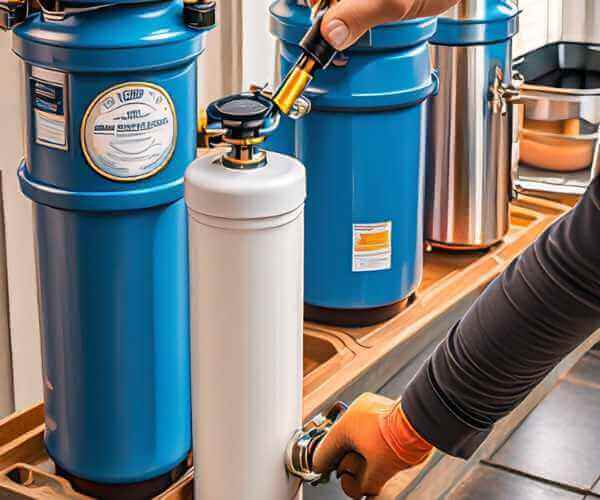Water is a fundamental necessity for life. However, the quality of the water we consume can significantly impact our health. This is where a whole-house water filter comes into play. A whole-house water filter is a crucial system that ensures the water you use and consume in your home is clean and safe. This article aims to provide comprehensive information about whole-house water filters, their importance, types, lifespan, replacement signs, and costs.
Understanding the functionality and importance of a whole-house water filter is essential for every homeowner. This knowledge can help you make informed decisions about your home’s water system, ensuring the health and safety of your family. So, let’s dive into the world of whole-house water filters.
Before we proceed, it’s important to note that this article is not a substitute for professional advice. Always consult with a water treatment professional before making decisions about your home’s water system. Now, let’s get started!
Key Takeaways:
- Whole-house water filters: are essential for ensuring clean and safe water throughout your home.
- Types: Include activated carbon, sediment, iron, manganese filters, and reverse osmosis systems.
- Lifespan: Varies based on filter type, water quality, and usage; average replacement intervals range from 6 to 12 months.
- Signs for Replacement: Decrease in water pressure, change in taste or smell, visible sediment.
- Replacement Process: Turn off the water supply, and drain system, replace the filter, and check for leaks.
- Cost: $20 to $200 for filter; $100 to $200 for professional installation.
- Benefits: Maintains water quality, saves money on energy bills, and extends water system lifespan.
Comprehending Whole-House Water Filtration Systems
A whole-house water filter, as the name suggests, is a filtration system that treats all the water entering your home. It is typically installed at the point where the main water line enters your house. This ensures that all the water used in your home—whether for drinking, cooking, bathing, or laundry—is filtered and safe.
The importance of clean water in the house cannot be overstated. Clean water is not just essential for drinking but also for cooking, bathing, and other household chores. Using unfiltered water can lead to a variety of health issues, including skin problems, gastrointestinal diseases, and other serious conditions. Therefore, a whole-house water filter is a worthwhile investment for every homeowner.
Whole-house water filters work by removing contaminants from the water. They can filter out chlorine, sediment, heavy metals, and other harmful substances. The exact contaminants a filter can remove depend on its type and specifications. You can learn more about different types of whole-house water filters in the next section.
Types of Whole-House Water Filters
There are several types of whole-house water filters available on the market. These include activated carbon, sediment, iron, and manganese filters and reverse osmosis systems. Each of these filters has its strengths and weaknesses, and the best one for you depends on your specific needs and water quality.
Activated carbon filters are excellent at removing chlorine, volatile organic compounds (VOCs), and other chemicals. Sediment filters are great for removing dirt, sand, and other large particles. Iron and manganese filters are designed to remove iron and manganese from water, while reverse osmosis systems can remove a wide range of contaminants, including heavy metals, bacteria, and viruses.
When it comes to lifespan and efficiency, there’s no one-size-fits-all answer. The lifespan of a filter depends on several factors, including the quality of your water and your water usage. However, on average, activated carbon filters last about 12 months, sediment filters last 6–12 months, iron and manganese filters last 3-5 years, and reverse osmosis membranes last 2-3 years.
Factors Affecting Filter Lifespan
Several factors influence the lifespan of a whole-house water filter. One of the most significant factors is the quality of your water. If your water has a high level of contaminants, your filter will need to work harder and will likely need to be replaced more frequently.
Another important factor is your household water usage. The more water you use, the more frequently your filter will need to be replaced. For example, a family of four will typically need to replace their filter more often than a single person living alone.
Other factors that can affect filter lifespan include the type of filter, the size of the filter, and the filter’s flow rate. It’s important to understand these factors so you can make an informed decision when choosing a filter and know when it’s time to replace it.
Pro Tips:
- Test your water annually to stay updated on its quality.
- Keep spare filters on hand for timely replacements.
- Set calendar reminders for routine maintenance to ensure consistent performance.
Signs That Your Filter Needs Replacement
Knowing when to replace your whole house water filter is crucial for maintaining water quality in your home. There are several signs that your filter may need to be replaced. These include a decrease in water pressure, a change in the taste or smell of your water, and visible sediment or particles in your water.
If you notice any of these signs, it’s likely time to replace your filter. However, these are not the only indicators. Some filters have a built-in indicator that will alert you when it’s time for a replacement. Additionally, you should always follow the manufacturer’s recommendations for filter replacement.
Ignoring these signs and failing to replace your filter can lead to a decrease in water quality and potential health risks. Therefore, it’s important to regularly check your filter and replace it as needed.
The Average Lifespan of a Whole House Water Filter
The average lifespan of a whole-house water filter varies based on the type of filter and the factors mentioned earlier. However, as a general rule, most manufacturers recommend replacing the filter every 6–12 months. This is just a guideline, and the actual lifespan can be shorter or longer depending on your specific circumstances.
Real-life factors can significantly alter the average lifespan of a filter. For example, if your water has a high level of contaminants, your filter may need to be replaced more frequently. Similarly, if you use a lot of water, your filter may not last as long as the manufacturer’s recommendation.
It’s important to remember that these are just averages, and your filter may need to be replaced more or less frequently. Always monitor your water quality and follow the manufacturer’s recommendations for filter replacement.
The Process of Replacing a Whole-House Water Filter
Replacing a whole house water filter is a relatively straightforward process, but it does require some basic plumbing knowledge. The first step is to turn off the water supply to your house. Next, you’ll need to drain the system by opening a faucet until the water stops flowing. Then, you can remove the old filter and replace it with a new one. Finally, turn the water supply back on and check for leaks.

While this process is simple in theory, it can be more complicated in practice. If you’re not comfortable doing it yourself, it’s best to hire a professional. A professional can ensure the job is done correctly and safely, preventing potential water damage and other issues.
Whether you choose to replace the filter yourself or hire a professional, it’s important to take safety precautions. Always turn off the water supply before starting the replacement process, and be careful not to overtighten the filter housing, as this can cause it to crack.
The Cost of Replacing a Whole House Water Filter
The cost of replacing a whole house water filter can vary widely depending on the type of filter and whether you do it yourself or hire a professional. On average, a new filter can cost anywhere from $20 to $200, depending on its type and quality.
If you choose to replace the filter yourself, the only cost will be the price of the new filter. However, if you hire a professional, you’ll also need to pay for labor. The cost of professional installation can vary, but it typically ranges from $100 to $200.
While the upfront cost of filter replacement can be significant, it’s important to consider the long-term cost benefits. Regularly replacing your filter can help prevent costly water damage and health issues, making it a worthwhile investment.
The Benefits of Regular Filter Replacement
Regular filter replacement is crucial for maintaining water quality in your home. A worn-out filter can’t effectively remove contaminants from your water, leading to a decrease in water quality. By regularly replacing your filter, you can ensure your water is always clean and safe to use.
Regular filter replacement can also save you money in the long run. A dirty or clogged filter can reduce water pressure, causing your water system to work harder and use more energy. By replacing your filter regularly, you can maintain optimal water pressure and reduce energy usage, saving you money on your utility bills.
Finally, regular filter replacement can extend the lifespan of your water system. A dirty or clogged filter can cause wear and tear on your water system, leading to costly repairs or replacements. By keeping your filter clean and functioning properly, you can prevent damage to your water system and extend its lifespan.
Conclusion
To maintain a clean and healthy water supply, it is essential to replace whole-house water filters regularly. The frequency of replacement depends on factors such as the type of filter, water quality, and usage level. On average, whole-house water filters should be replaced every 6, 9, or 12 months. However, if you live in an area with hard water or high sediment levels, you may need to change the filters more frequently. Regular filter replacements help maintain high-quality water output and protect your system from clogs and leaks.
Frequently Asked Question
How often should I replace my whole house water filter?
Regular replacement intervals typically range from every three to six months, but it ultimately depends on the specific filter type, water quality, and usage. It’s advisable to check the manufacturer’s recommendations for your particular system.
What factors influence the replacement frequency of a whole-house water filter?
The rate at which you should replace your water filter can be affected by the water quality in your area, the filter’s capacity, the number of users in your household, and the specific contaminants the filter is designed to address. Monitoring these factors can help determine when it’s time for a replacement.
How do I know when it’s time to replace my whole house’s water filter?
Many filters come with an indicator light that signals when replacement is needed. Additionally, a decrease in water pressure or a change in the taste and odor of your water can indicate a clogged or exhausted filter. Regular monitoring and awareness of these signs are essential.
Can I extend the life of my whole-house water filter?
While you cannot extend the actual lifespan of a filter, you can optimize its performance by following proper maintenance practices. Regularly changing pre-filters, conducting routine system checks, and using water softeners if necessary can contribute to a longer effective lifespan for your whole house water filter.
Are there specific water filter maintenance tips I should follow?
To ensure optimal performance, it’s recommended to flush the system before installing a new filter, clean pre-filters regularly, and follow the manufacturer’s guidelines for maintenance. Additionally, scheduling periodic water tests can help identify changes in water quality and prompt timely filter replacements.

Ross Walters, an Electrical supplies and Water Appliances specialist, shares his extensive expertise on top platforms. With a focus on empowering professionals and enthusiasts, Ross delivers up-to-date insights and practical advice. His commitment to staying abreast of industry trends establishes him as a trusted source for navigating the complexities of electrical systems and water appliances.

